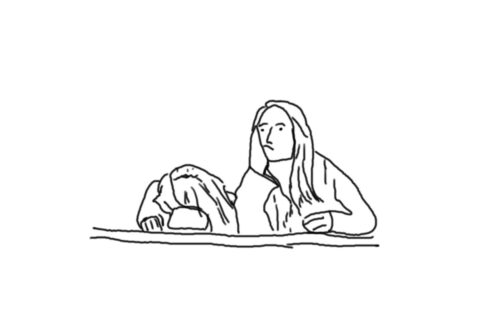Do we have doxastic obligations, obligations of belief? Is the sentence, ‘You ought to believe p’ intelligible or does it reduce to ‘p is true’ or ‘I want you to agree with me’?
Say ‘S believes p’ is true. It tells us something about S but nothing about whether S ought to believe p. But we do think that there is some connection between belief and true propositions that is somehow related to a person’s obligations.
We Can’t Believe Anything We Want
We don’t really think that anyone can believe anything they want. We might say, ‘you can believe anything you want,’ but what we mean by freedom of belief is freedom from coercion. Very few people think one can be forced to believe anything and we rightly think doing so is immoral especially if it involves using physical force or state power.
Nonetheless, we think people are failing to meet their obligations when they believe all sorts of obvious falsehoods. They are genuinely doing something wrong. But what does this wrongness amount to? It is not the same as robbing a bank or bullying a child. But it’s not the same as merely having a taste for raw broccoli either.
We have an Obligation to Believe the Truth
The most obvious answer is that there is some obligatory connection between the truth of a proposition and our attitude toward it.
One suggestion might be that we have an obligation to believe true propositions. How might this work? Perhaps if p is true, then S is obliged to believe it. Is that right? No. For suppose S has not even considered p. In that case, S wouldn’t be doing anything wrong in not believing p. Thus, it can’t be the case that if p is true, then S ought to believe it.
Perhaps S ought to believe p only if p is true. If there is any doxastic obligation, then this is most likely it. The truth of a proposition is the necessary, but not sufficient, condition for an obligation to obtain.
Belief verses Justification
Someone might ask, ‘if S believes p, and p turns out to be false, would S have done something wrong?’ It is surely not the case that every time one believes something false one has done something wrong. One might be mistaken or misled. Being mistaken or misled is not good, but it isn’t the kind of thing for which I am responsible in the sense of having done something wrong. Doesn’t this serve as a counter-example to the view?
One reply is to suggest that when one is misled or mistaken, one has experienced a failure of method. The means for meeting one’s obligation to believe only true proposition has not worked as it ought. In some cases, the failure is not one’s own fault.
As Paul Boghossian points out, we don’t actually try to follow the rule directly (Boghossian, 2005). Instead, one has to follow other rules in order to meet our obligation. For example, ‘laws of thought’ and ‘laws of inference’ are instrumental to meeting our obligations to believe only what is true. Justification obligations obtain only if the doxastic obligation does.
Boghossian claims that any obligations we have in justifying our beliefs or supplying a defense of the proper workings of our belief forming mechanisms are instrumental in meeting a more fundamental obligation to believe only what is true. Thus, though the obligation is not transparent, it is fundamental to all our other obligations for how we meet it.
Boghossian’s view seems right to me. It is also helpful for wider discussions of epistemic obligation. Though we differ in what obligations we have in regards to justifying our beliefs, we all ground those obligations in a single obligation to believe only what is true.
A Truth Objection
There are all sorts of objections one might have to the above formulation. For example, so far I have implied that there is a property of propositions that renders a believer obligated to them in some way. But why think of propositions that way? Perhaps there is no such property. Those who take such a view deflate the property of truth. If there isn’t a property of truth, then what is it that we are supposed to believe? I don’t have the space to refute deflationary theories of truth, suffice to say that I don’t think any of them actually do what they attempt to do – they all end up dependent upon the reality of truth.
Further, there are those who don’t think there is any way to make sense of what makes a proposition true. However, it doesn’t much matter what one says about truth makers as long as one holds that propositions bear there property, then the doxastic obligation still holds.
Leaving aside questions of what makes p true and whether there is such a property, we now need some way to make sense of our obligation. After all, as I mentioned, the obligation to believe something isn’t the same as a moral obligation. So what to say about doxastic obligations if there are any?
What is an Obligation?
Obligations in general are rather basic to our intuitions. But what is it to be ‘under an obligation’?
One answer is to suggest that obligations are inexplicable. They are a kind of given in the universe that require no explanation. I find this unconvincing. Obligations are precisely the kinds of things that require explanations.
A suggestive answer I think has merit is that obligations only obtain between persons. For example, Robert Adams argues that obligations are the kinds of things we are motivated to meet. Adams argues that the best explanation for this motivation is that we value the relationships we find ourselves in. For example, when we fail to perform an obligatory action, we experience guilt. The experience of guilt implies that we have harmed another person or alienated ourselves from other people.
Such a view also makes sense of our heightened awareness of our doxastic obligation when we state beliefs publicly. Anyone with a conscience about such things thinks twice before tweeting. And we don’t like it when other people say things patently false. Being right and wrong is not merely about our attitudes being in the right state, but it is about our statements we make being correct. Lying is a big deal.
However, if obligations are identical to actual demands made by social groups, then there are only non-objective social obligations. In other words, social conventions are not an explanation for objective obligations. Conventions, after all, don’t ground any objective obligations though conventions might provide the means for following an obligation. Hence, obligations are not identical to actual demands made by social groups.
We are left with a dilemma: either doxastic obligations are conventional and not objective or they are objective and not social.
Given enough space, we might construct some non-social ground for obligations. However, there is another way out of the dilemma. The dilemma only supposes that obligations depend on some social environment comprising contingent persons. But that does not exhaust the options. If God exists, then he is not contingent and any obligation we have is an obligation to God. Thus, it is both objective and social.
Paul Boghossian, “Is Meaning Normative?” in Content and Justification: Philosophical Papers, 101-105.
Michael Rea and Michael Murray, An Introduction to the Philosophy of Religion (New York: Cambridge Press, 2008), 240–242.





